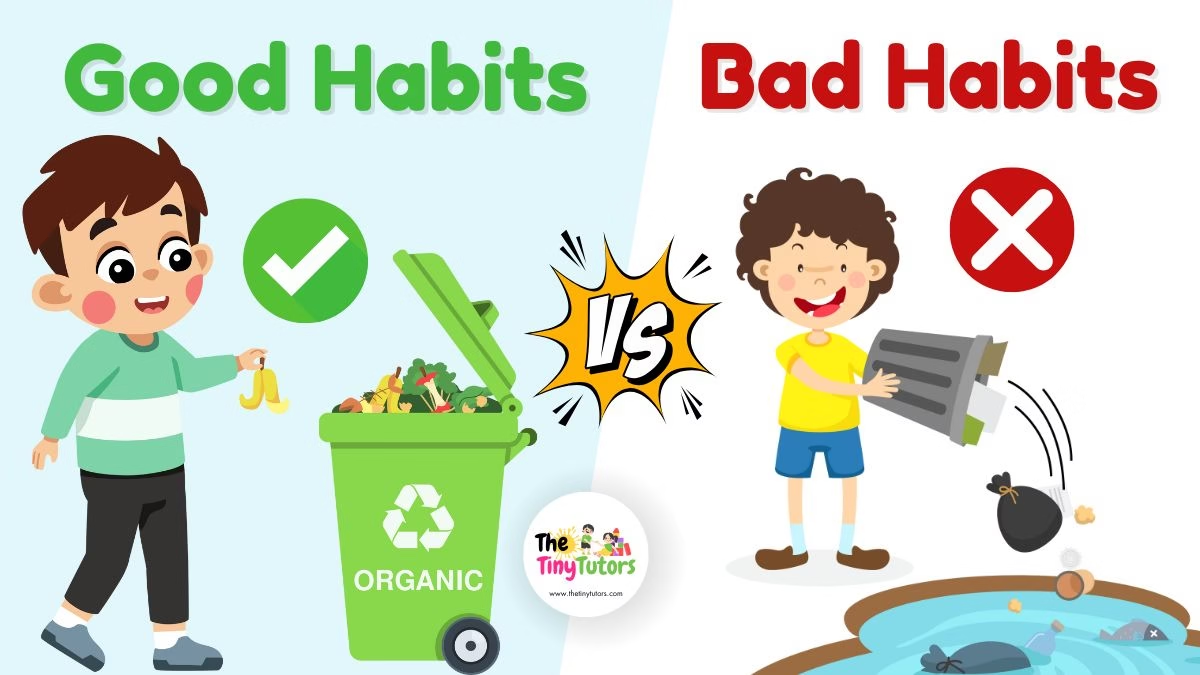Good Habits and Bad Habits for Kids play a big role in shaping everyday life. Whether it’s brushing your teeth, choosing healthy food, or having fun with friends, the habits you develop now can have a huge impact on your future. As we move into 2025, it’s more important than ever for kids to develop healthy, positive habits that will help them grow stronger, happier, and more successful. At the same time, being aware of the Good Habits and Bad Habits for Kids can make a big difference in avoiding habits that could hold you back.`1
- Early to Bed, Early to Rise vs. Late to Bed, Late to Rise
- Brushing Teeth Regularly vs. Not Brushing Teeth Regularly
- Bathing Every Day vs. Not Bathing Every Day
- Eating Healthy Food vs. Eating Unhealthy Food
- Telling the Truth vs. Lying to Someone
- Washing Hands Before Eating vs. Eating Without Washing Hands
- Exercising Daily vs. Not Exercising Daily
- Daily Reading vs. Not Reading Daily
- Playing Sometimes vs. Playing All the Time
- Being Kind with Everyone vs. Being Rude with Everyone
- Getting Enough Sleep Every Day vs. Not Getting Enough Sleep Every Day
- Be Hygienic vs. Being Unhygienic
- Organizing Your Room vs. Having an Unorganized Room
- Comb Your Hair vs. Not Combing Hair
- Spending Time with Family vs. Spending Time with TV and Mobile
- Money Management vs. Not Managing Money
- Value Your Time vs. Wasting Time
- Praying Daily vs. Not Praying Daily
- Putting Garbage in the Dustbin vs. Throwing Garbage Anywhere
- Finishing Your Work on Time vs. Not Finishing Work on Time
In this fun and easy-to-follow guide, we’re going to explore some of the most important Good Habits and Bad Habits for Kids. We’ll also share simple and enjoyable tips to help you make better choices every day. Understanding the importance of Good Habits and Bad Habits for Kids can empower you to make decisions that will set you up for success and happiness as you grow.
When it comes to growing up strong, healthy, and happy, Good Habits and Bad Habits for Kids play a big role. Whether it’s waking up early or brushing your teeth, these habits shape how kids feel and perform every day.
Read more: Bird Names for Kids 2025 – Discover Fun and Fascinating Birds
They include actions like brushing your teeth regularly, eating nutritious food, exercising, and getting enough sleep. Bad Habits for Kids: Bad habits are actions or behaviors that can harm the body, mind, or overall well-being. These habits can cause long-term problems such as poor health, lack of focus, and even difficulties with relationships. Examples of bad habits include not brushing your teeth, eating junk food, or skipping exercise.
Early to Bed, Early to Rise vs. Late to Bed, Late to Rise
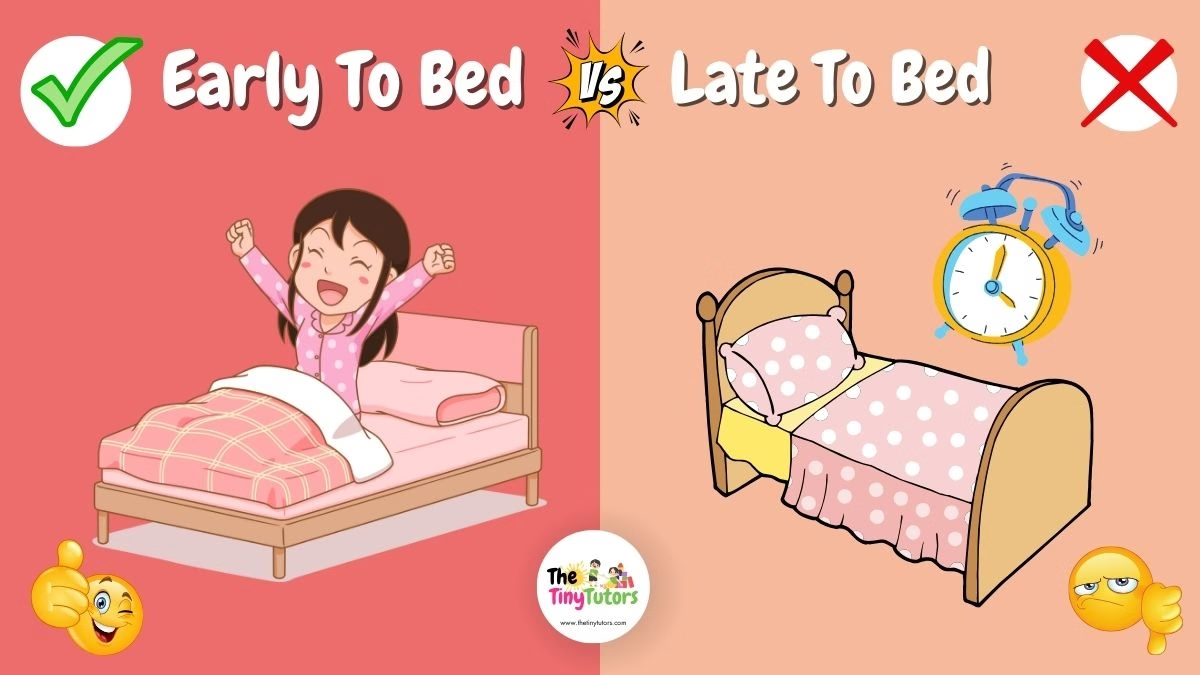
Good Habit: Early to Bed, Early to Rise
Explanation: Going to bed early and waking up early are great examples of good habits for kids. These good habits help kids get enough sleep, which is essential for their growth and focus. On the other hand, staying up late and waking up late are bad habits for kids that can affect their health and concentration. Encouraging good habits like an early bedtime ensures kids get the rest they need for better development and focus.
Benefits: Good Habits and Bad Habits for Kids
Boosts energy levels for school and activities.
Improves mood and concentration.
Helps the body repair and grow.
Bad Habit: Late to Bed, Late to Rise
Disadvantages: Good Habits and Bad Habits for Kids
Staying up late and waking up late is a Bad Habit for Kids that can lead to tiredness, lack of focus, and poor health.
Leads to tiredness and difficulty concentrating.
May cause problems in school performance.
Brushing Teeth Regularly vs. Not Brushing Teeth Regularly
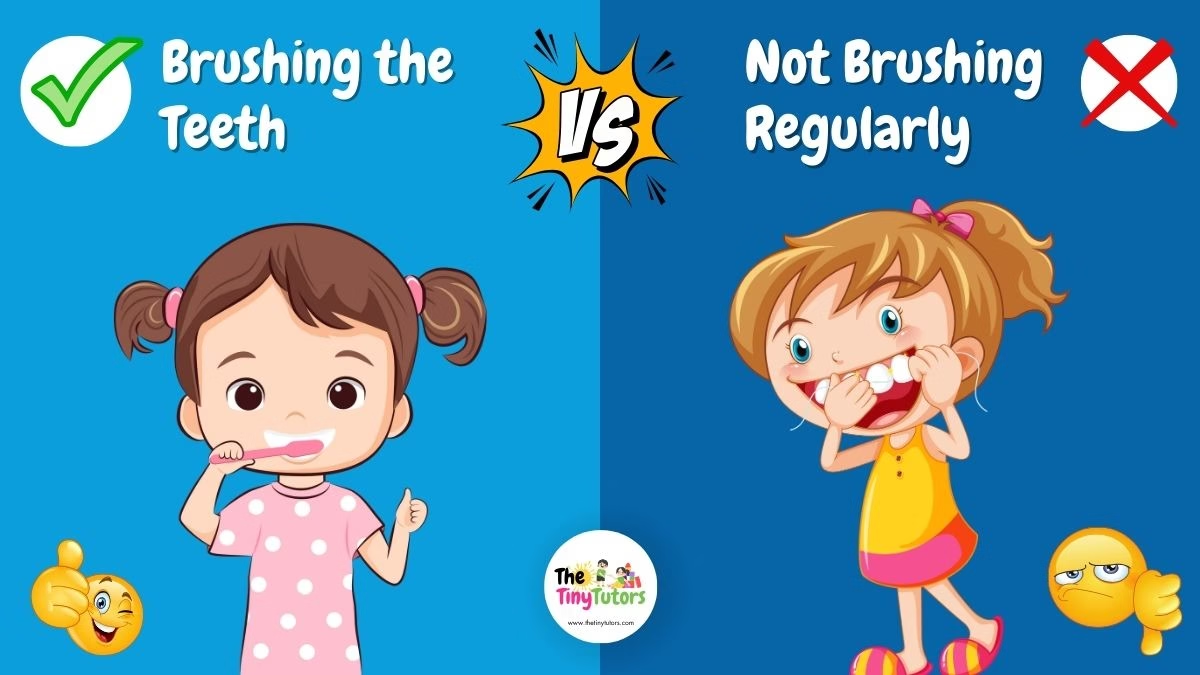
Good Habit: Brushing Teeth Regularly
Explanation: Brushing your teeth regularly is one of the most important good habits for kids to develop. It plays a crucial role in maintaining overall dental hygiene, as it helps remove food particles and plaque that can lead to tooth decay and cavities. By brushing at least twice a day, children can ensure their teeth stay clean and healthy, preventing issues like gum disease and bad breath.
Additionally, consistent brushing habits help establish a foundation for lifelong oral health, teaching kids the importance of taking care of their teeth from a young age. With proper brushing techniques, kids can enjoy a bright smile and avoid the discomfort and expense of dental treatments later on.
Benefits: Good Habits and Bad Habits for Kids
Prevents tooth decay.
Keeps your breath fresh.
Promotes overall health.
Bad Habit: Not Brushing Teeth Regularly
Disadvantages: Good Habits and Bad Habits for Kids
Not brushing your teeth regularly is a Bad Habit for Kids that leads to bad breath, tooth decay, and other dental issues.
Causes bad breath.
Leads to painful dental problems in the future.
Bathing Every Day vs. Not Bathing Every Day

Good Habit: Bathing Every Day
Explanation: Bathing daily is an essential habit that helps keep your body clean, refreshed, and free from germs. When you bathe, you remove dirt, sweat, and oils that naturally accumulate on your skin throughout the day. Regular bathing helps to eliminate bacteria and germs that can cause infections, skin irritation, or unpleasant odors. It also promotes healthy skin by keeping pores unclogged, reducing the risk of acne or other skin conditions.
Beyond hygiene, taking a daily bath or shower can also be a great way to relax, feel refreshed, and boost your mood, making it an important part of self-care. By maintaining a clean body, you not only feel better physically but also help prevent the spread of illness to others.
Benefits: Good Habits and Bad Habits for Kids
Keeps the skin clean and healthy.
Helps in maintaining good hygiene.
Prevents infections and body odor.
Bad Habit: Not Bathing Every Day
Disadvantages: Good Habits and Bad Habits for Kids
Increases the chances of body odor.
Can lead to skin irritations and infections.
Makes you feel less fresh.
Eating Healthy Food vs. Eating Unhealthy Food
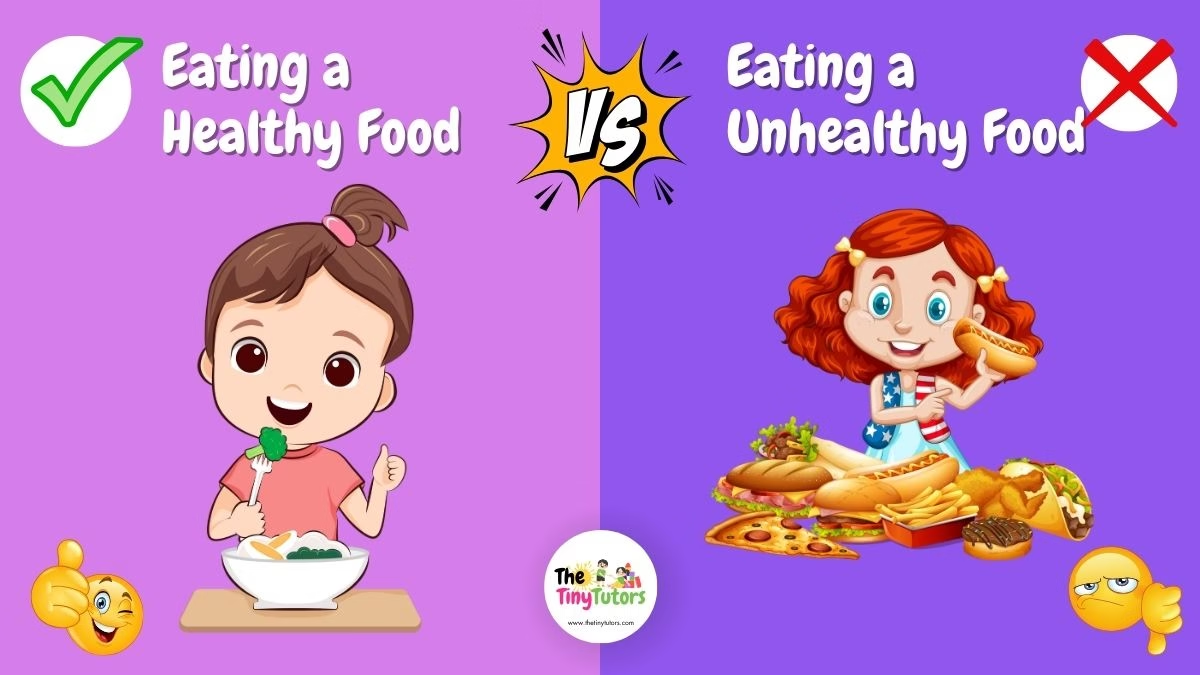
Good Habit: Eating Healthy Food
Explanation: Eating healthy foods like fruits, vegetables, and whole grains is a Good Habit for Kids. It provides energy and nutrients for growing bodies.
Benefits: Good Habits and Bad Habits for Kids
Helps with growth and development.
Boosts energy and immune system.
Keeps your body strong and healthy.
Bad Habit: Eating Unhealthy Food
Disadvantages: Good Habits and Bad Habits for Kids
Eating unhealthy food like junk food and sugary snacks is a Bad Habit for Kids that can lead to weight gain, poor energy levels, and health problems.
Increases the risk of diseases like diabetes.
Affects mood and concentration.
Telling the Truth vs. Lying to Someone
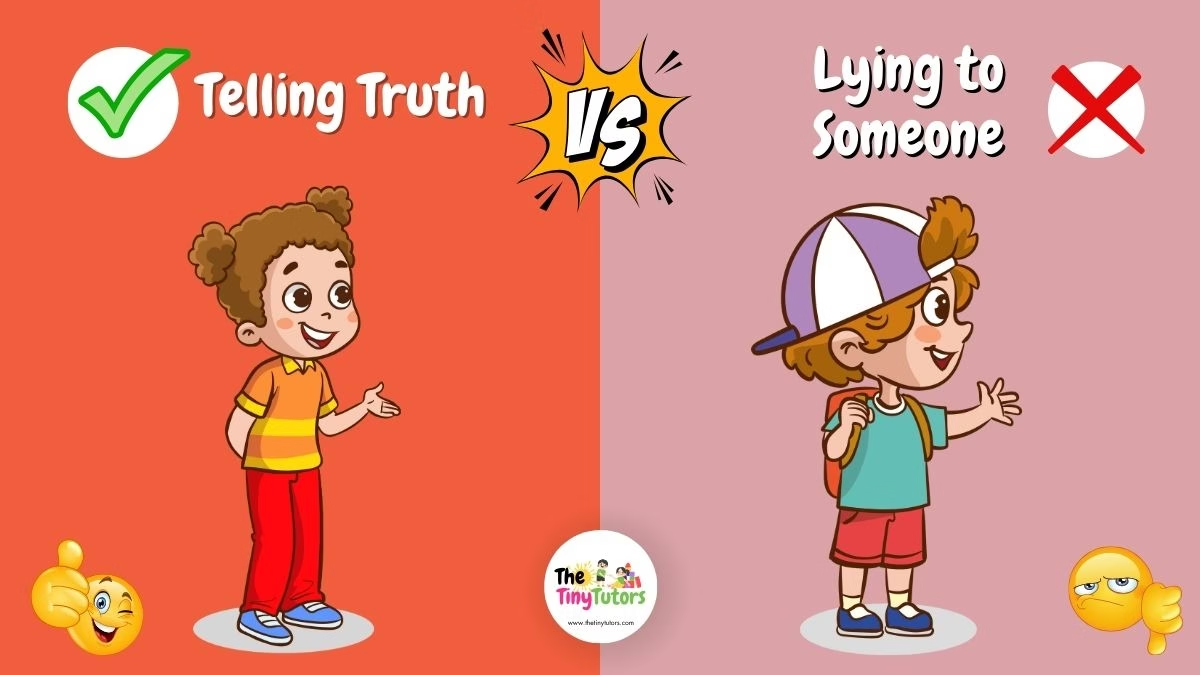
Good Habit: Telling the Truth
Explanation: Being honest builds trust and helps develop good relationships with friends and family.
Benefits: Good Habits and Bad Habits for Kids
Strengthens trust with others.
Helps avoid unnecessary stress and guilt.
Promotes respect and integrity.
Bad Habit: Lying to Someone
Disadvantages: Good Habits and Bad Habits for Kids
Breaks trust with others.
Causes guilt and stress.
Can lead to problems in relationships.
Visit our channel: Good Habits vs Bad Habits for Kids | Learn Healthy Habits with Pictures | The Tiny Tutors
Washing Hands Before Eating vs. Eating Without Washing Hands
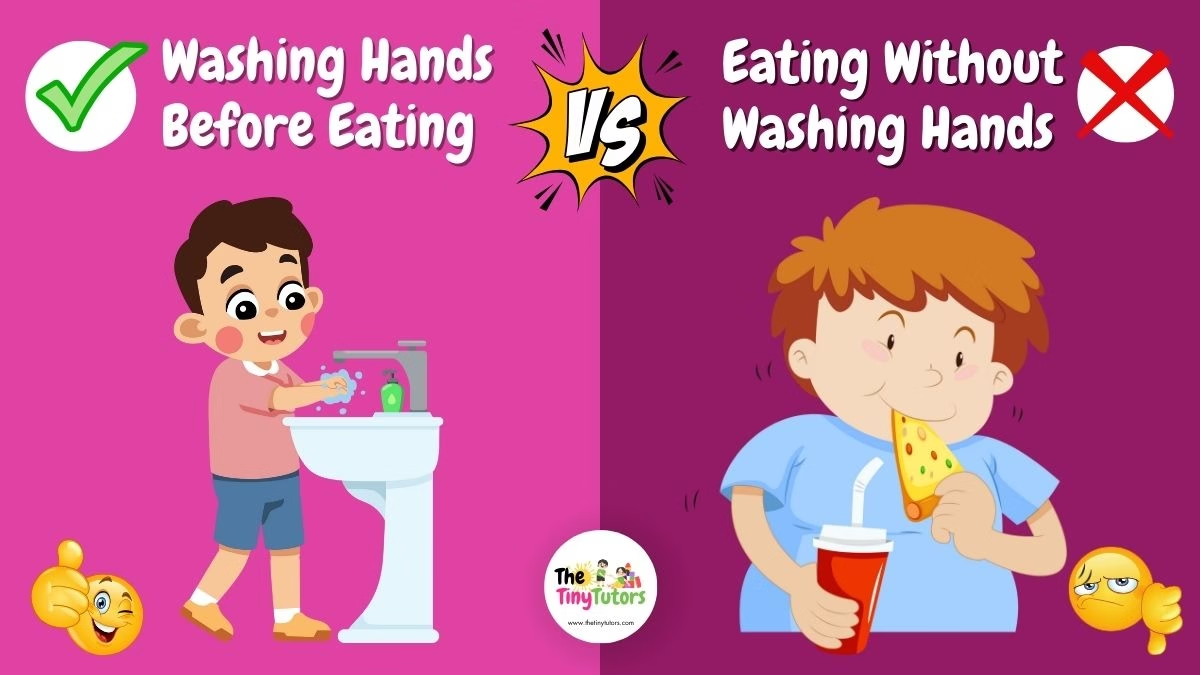
Good Habit: Washing Hands Before Eating
Explanation: Washing your hands before eating is a Good Habit for Kids. It prevents germs from spreading and reduces the risk of getting sick.
Benefits: Good Habits and Bad Habits for Kids
Reduces the risk of illness.
Keeps your body clean and safe from bacteria.
Encourages good hygiene.
Bad Habit: Eating Without Washing Hands
Disadvantages: Good Habits and Bad Habits for Kids
Not washing your hands before eating is a Bad Habit for Kids. It allows germs to enter your body and can cause stomach problems or colds.
Spreads germs and bacteria.
Causes stomachaches and infections.
Exercising Daily vs. Not Exercising Daily
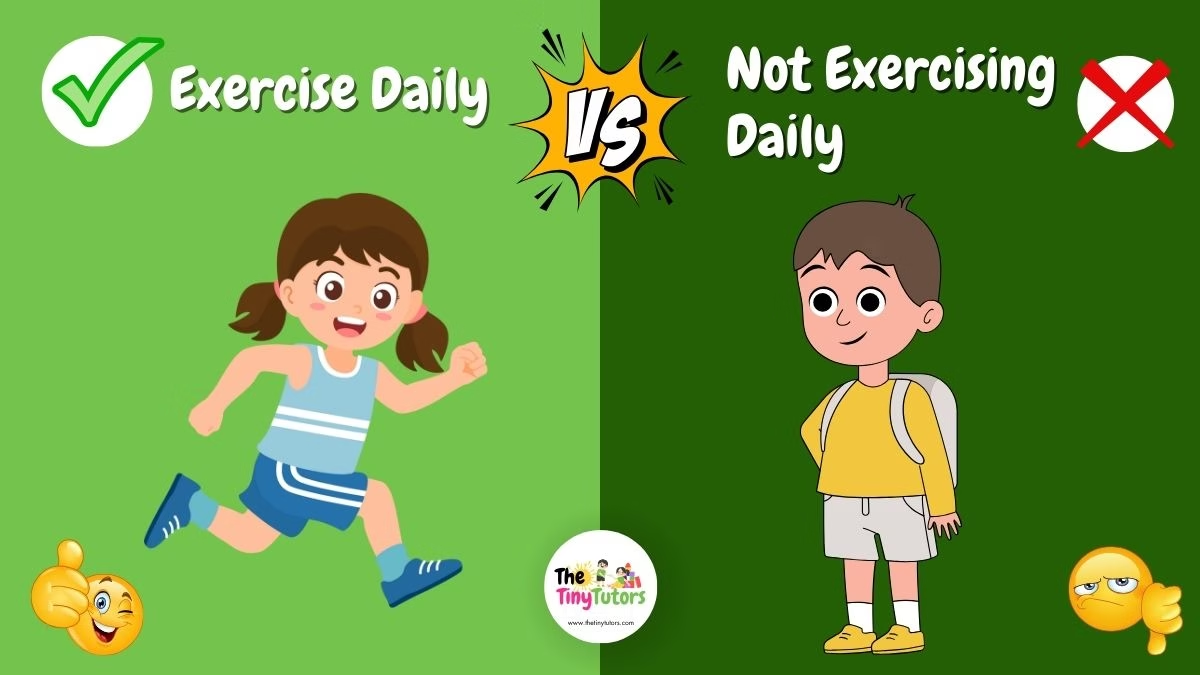
Good Habit: Exercising Daily
Explanation: Regular physical activity helps to keep the body fit, strong, and full of energy.
Benefits: Good Habits and Bad Habits for Kids
Builds muscles and bones.
Improves mood and mental health.
Keeps the heart and lungs healthy.
Bad Habit: Not Exercising Daily
Disadvantages: Good Habits and Bad Habits for Kids
Can lead to weight gain and weak muscles.
Makes you feel sluggish and tired.
Increases the risk of health problems later in life.
Daily Reading vs. Not Reading Daily
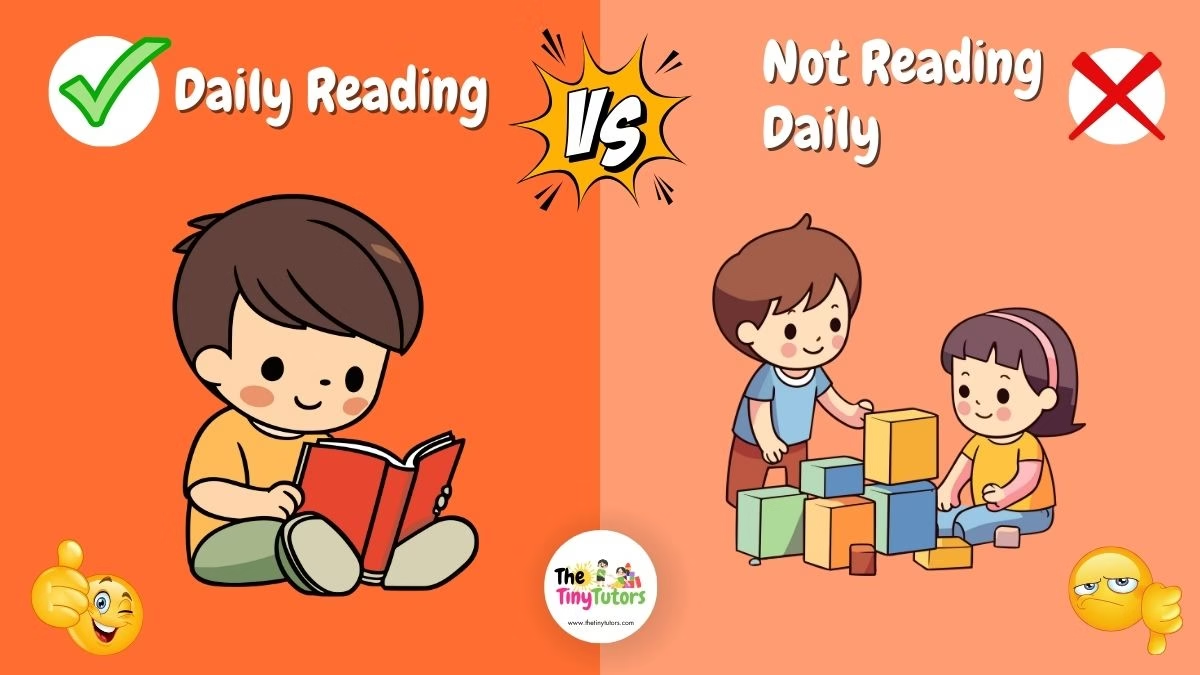
Good Habit: Reading Daily
Explanation: Reading helps improve vocabulary, imagination, and learning skills.
Benefits: Good Habits and Bad Habits for Kids
Enhances knowledge and language skills.
Builds concentration and focus.
Increases creativity and imagination.
Bad Habit: Not Reading Daily
Disadvantages: Good Habits and Bad Habits for Kids
Reduces vocabulary and knowledge.
Limits creative thinking and problem-solving.
Affects academic performance.
Playing Sometimes vs. Playing All the Time
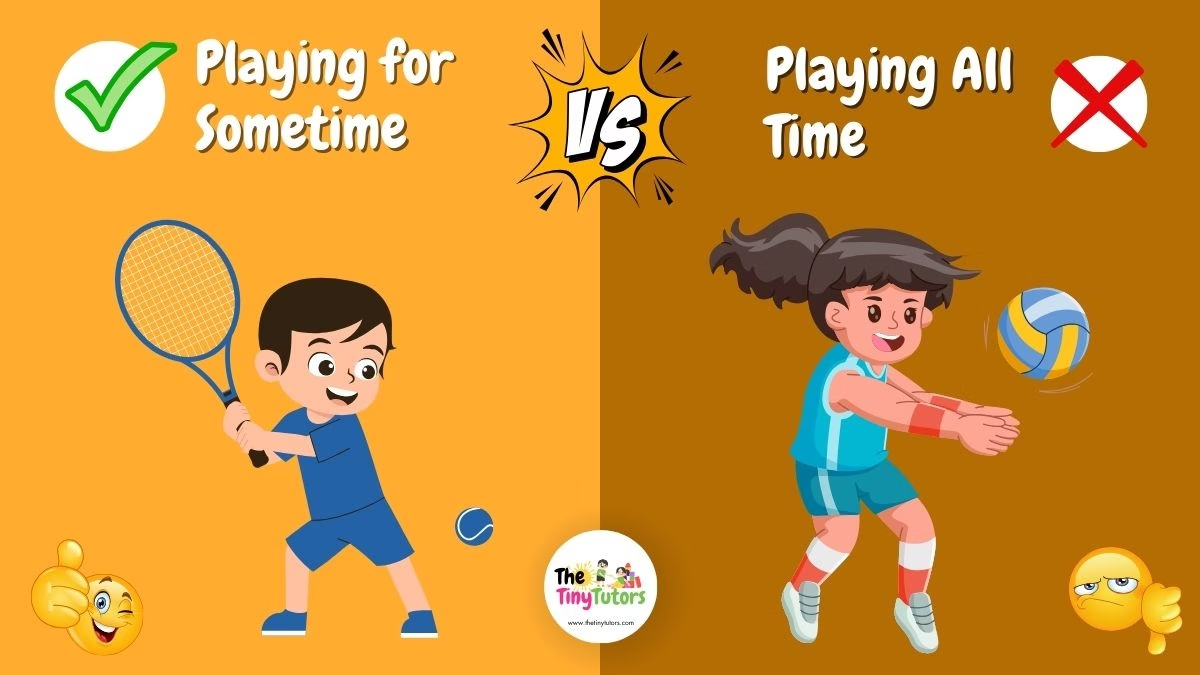
Good Habit: Playing Sometimes
Explanation: Playtime is important for social development, creativity, and fun, but it’s best enjoyed in moderation.
Benefits: Good Habits and Bad Habits for Kids
Encourages physical activity and teamwork.
Improves social skills.
Boosts creativity and imagination.
Bad Habit: Playing All the Time
Disadvantages: Good Habits and Bad Habits for Kids
Neglects important responsibilities like homework or chores.
Can lead to laziness and lack of focus.
May cause conflicts with others.
Being Kind with Everyone vs. Being Rude with Everyone
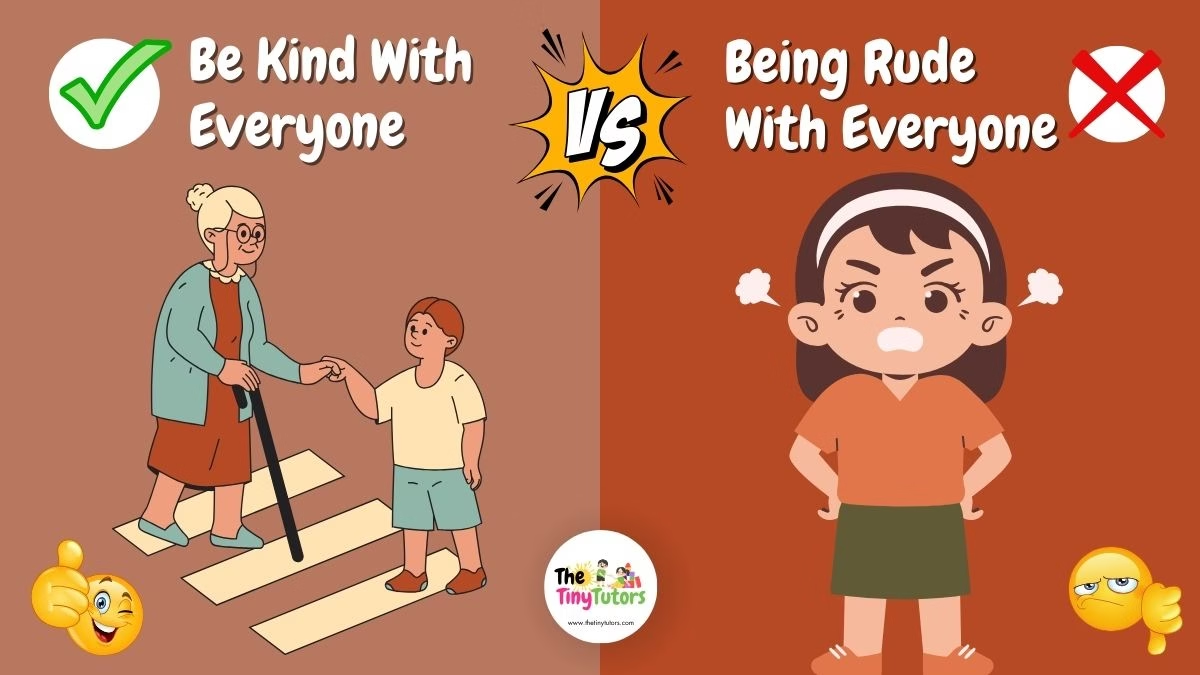
Good Habit: Being Kind with Everyone
Explanation: Showing kindness makes the world a better place and helps you build strong relationships with others.
Benefits: Good Habits and Bad Habits for Kids
Builds trust and friendships.
Makes people feel good and valued.
Promotes a positive and supportive environment.
Bad Habit: Being Rude with Everyone
Disadvantages: Good Habits and Bad Habits for Kids
Hurts feelings and breaks relationships.
Creates a negative atmosphere.
Causes stress and conflicts.
Getting Enough Sleep Every Day vs. Not Getting Enough Sleep Every Day
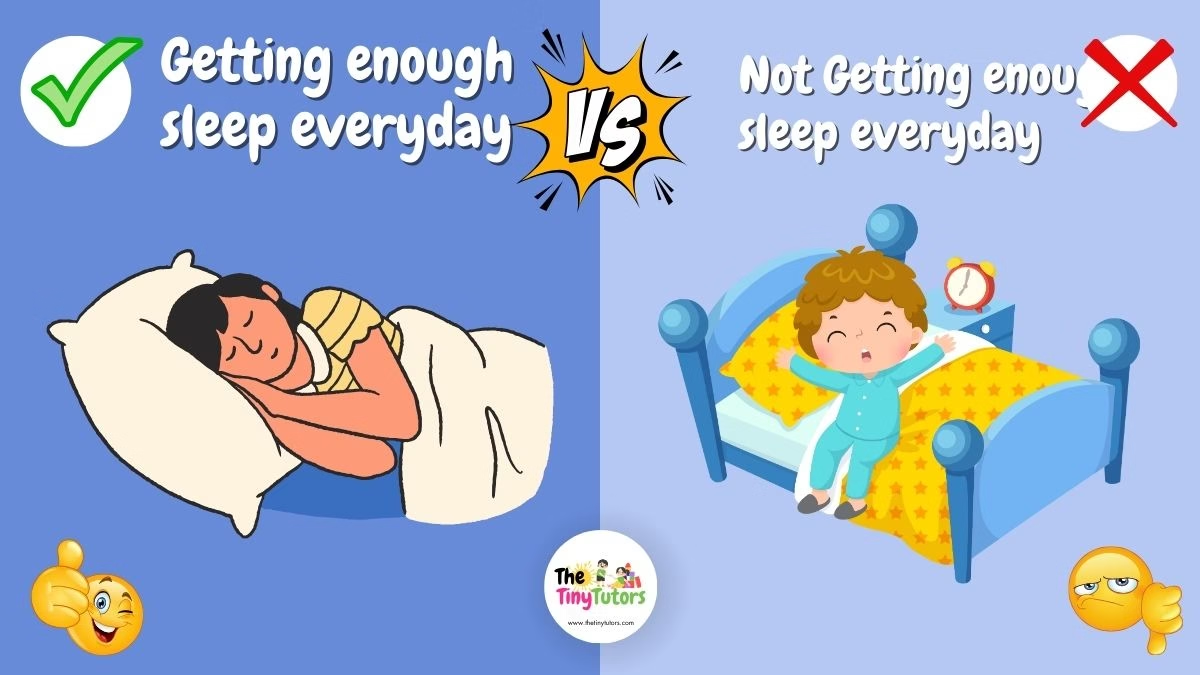
Good Habit: Getting Enough Sleep Every Day
Explanation: Getting enough sleep helps kids stay energized, focused, and happy.
Benefits: Good Habits and Bad Habits for Kids
Boosts memory and learning.
Keeps the body healthy.
Improves mood and concentration.
Bad Habit: Not Getting Enough Sleep Every Day
Disadvantages: Good Habits and Bad Habits for Kids
Leads to tiredness and irritability.
Affects concentration and mood.
Reduces performance at school.
Be Hygienic vs. Being Unhygienic
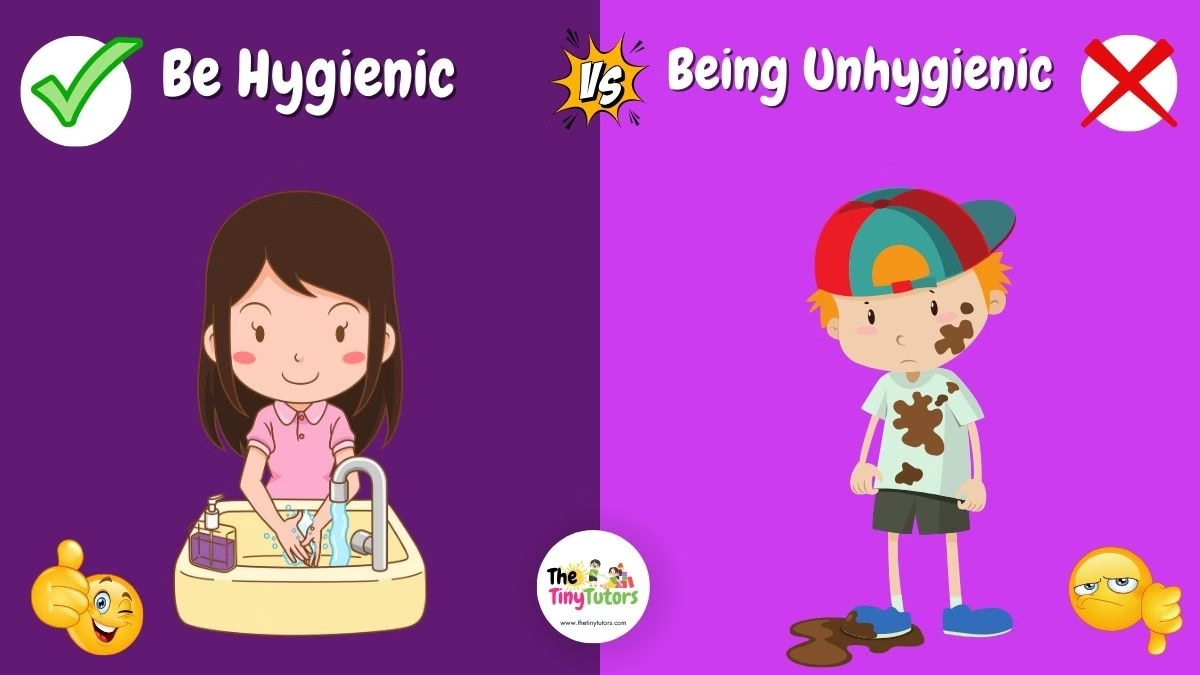
Good Habit: Be Hygienic
Explanation: Good hygiene means keeping your body, clothes, and surroundings clean. Washing hands, brushing your teeth, and wearing clean clothes help you stay healthy and fresh!
Benefits: Good Habits and Bad Habits for Kids
Keeps your body clean and prevents illnesses.
Promotes good health and reduces the risk of infections.
Makes you feel confident and comfortable.
Bad Habit: Being Unhygienic
Disadvantages: Good Habits and Bad Habits for Kids
Increases the risk of getting sick and spreading germs.
Can lead to body odor, skin problems, and infections.
Makes you feel uncomfortable and may affect your confidence.
Organizing Your Room vs. Having an Unorganized Room
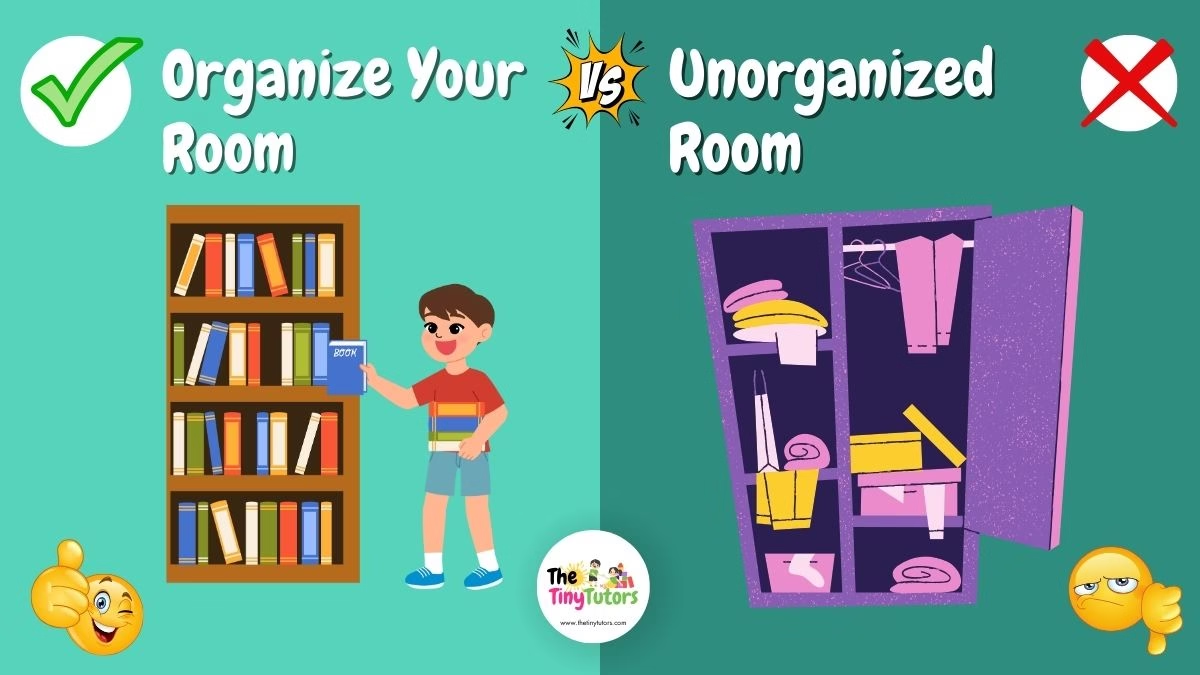
Good Habit: Organize Your Room
Explanation: Keeping your room tidy and organized is a great habit. It makes it easier to find things and creates a peaceful environment to study and play.
Benefits: Good Habits and Bad Habits for Kids
Creates a sense of responsibility and cleanliness.
Reduces stress and helps you feel relaxed.
Bad Habit: Having an Unorganized Room
Disadvantages: Good Habits and Bad Habits for Kids
Makes it hard to find things and stay organized.
Leads to unnecessary mess and clutter.
Increases stress and makes your room less inviting.
Comb Your Hair vs. Not Combing Hair

Good Habit: Comb Your Hair
Explanation: Combing your hair every day helps you look neat and feel fresh. It also keeps your hair healthy by preventing tangles and breakage.
Benefits: Good Habits and Bad Habits for Kids
Keeps your hair smooth and healthy.
Helps you look neat and put-together.
Reduces the risk of hair damage.
Bad Habit: Not Combing Hair
Disadvantages: Good Habits and Bad Habits for Kids
Leads to tangled, messy hair.
Can cause hair breakage and split ends.
Makes you look less neat and unkempt.
Spending Time with Family vs. Spending Time with TV and Mobile
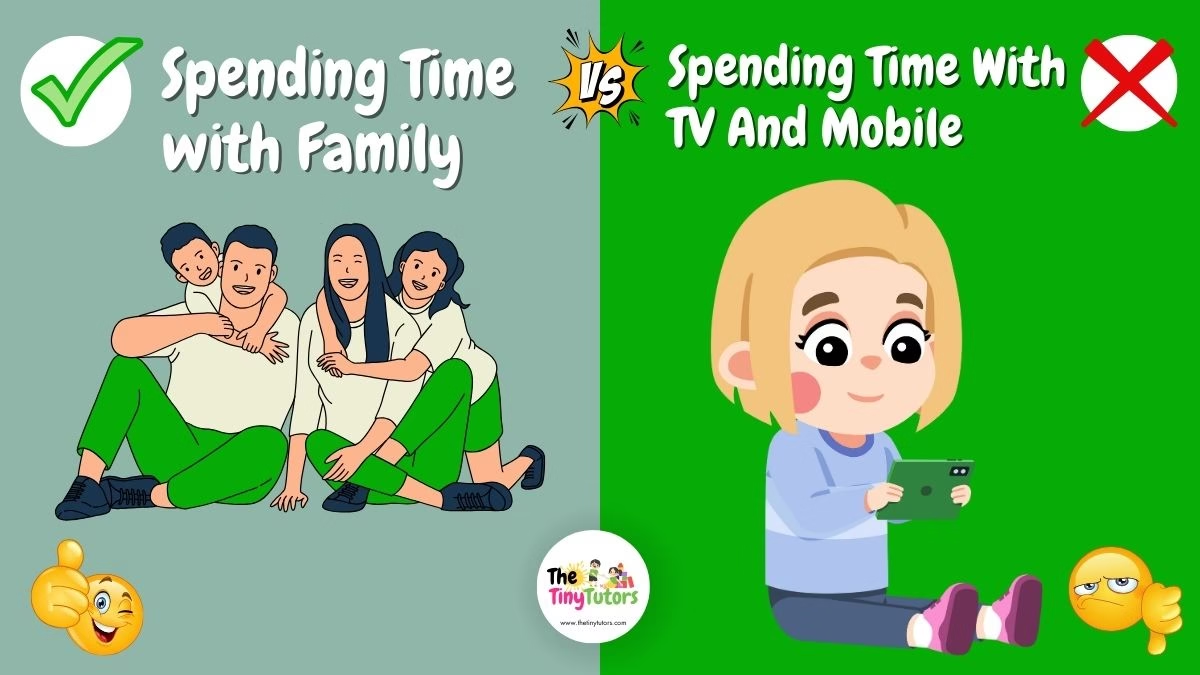
Good Habit: Spending Time with Family
Explanation: Spending quality time with your family helps build strong relationships and creates lasting memories. You can play games, talk, and do activities together.
Benefits: Good Habits and Bad Habits for Kids
Strengthens family bonds and communication.
Provides emotional support and love.
Creates fun and happy experiences.
Bad Habit: Spending Time with TV and Mobile
Disadvantages: Good Habits and Bad Habits for Kids
Reduces social interaction with family and friends.
Can lead to a sedentary lifestyle and poor health.
May affect school performance and sleep patterns.
Money Management vs. Not Managing Money
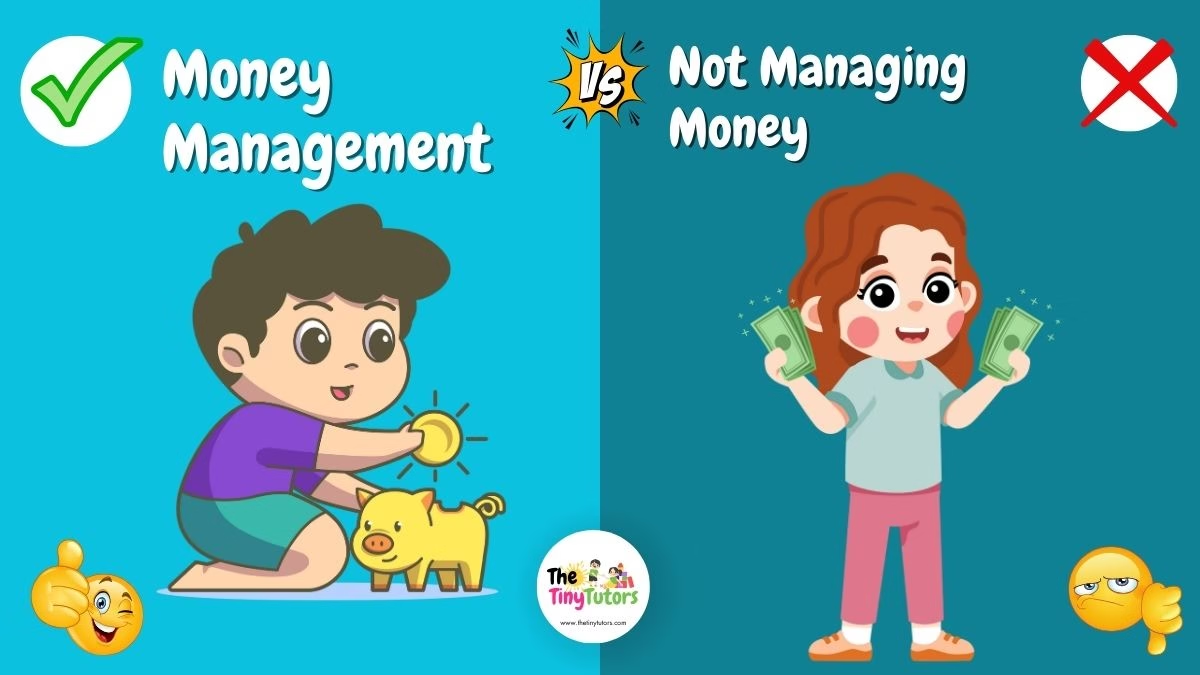
Good Habit: Money Management
Explanation: Learning to manage money, whether it’s saving a little pocket money or budgeting for something you want, is an important life skill.
Benefits: Good Habits and Bad Habits for Kids
Teaches responsibility and planning.
Helps save money for future goals.
Avoids overspending and teaches financial responsibility.
Bad Habit: Not Managing Money
Disadvantages: Good Habits and Bad Habits for Kids
Leads to wasted money and poor savings.
Can cause financial problems in the future.
Promotes impulsive spending without thinking about the consequences.
Value Your Time vs. Wasting Time
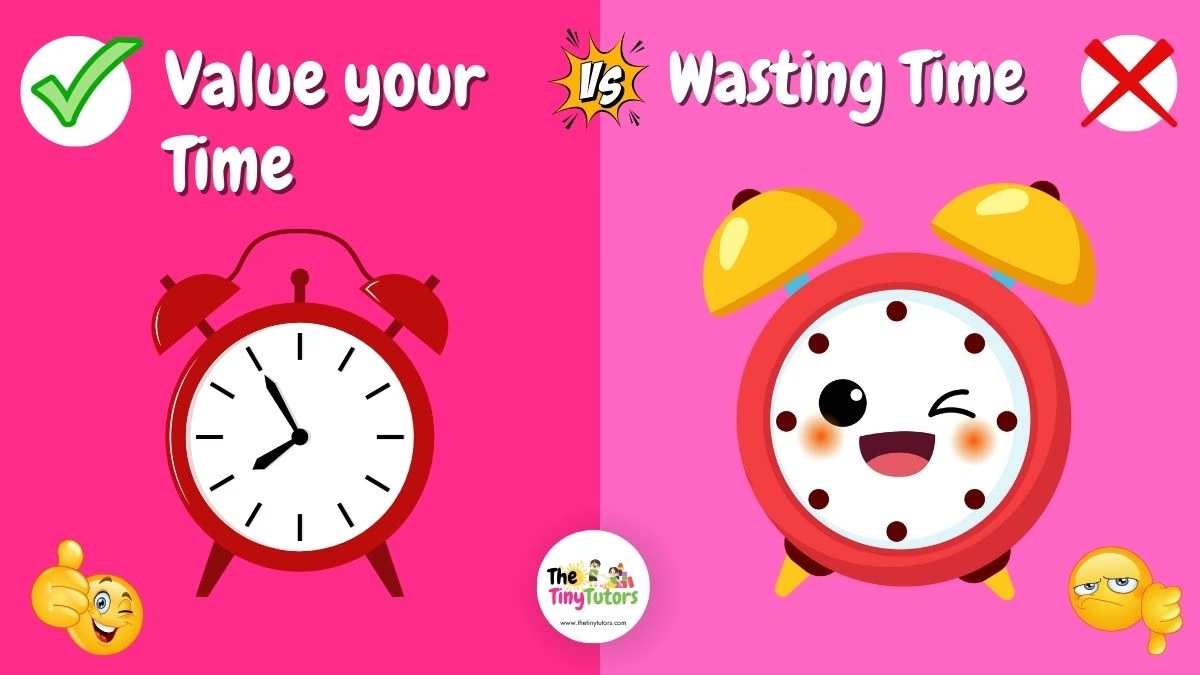
Good Habit: Value Your Time
Explanation: Valuing your time means using it wisely and making conscious choices to engage in activities that contribute to your growth, well-being, and relationships. Instead of wasting time on distractions, it’s about prioritizing productive and meaningful activities, such as studying to learn new things, playing to stay active and enjoy life, or spending quality time with family and friends to build strong bonds.
When you value your time, you are more focused and intentional with how you spend each moment, ensuring that it brings you closer to your goals or simply enhances your happiness. This habit helps you stay organized, reduce stress, and make the most of each day, leading to a more fulfilling and balanced life. By recognizing the importance of time, you also develop better self-discipline, planning skills, and a greater appreciation for the time you have.
Benefits: Good Habits and Bad Habits for Kids
Helps you achieve goals and be more productive.
Increases focus and efficiency.
Creates a sense of accomplishment and satisfaction.
Bad Habit: Wasting Time
Disadvantages: Good Habits and Bad Habits for Kids
Leads to procrastination and stress.
Misses opportunities for learning and growing.
Makes it harder to finish tasks or reach goals.
Praying Daily vs. Not Praying Daily
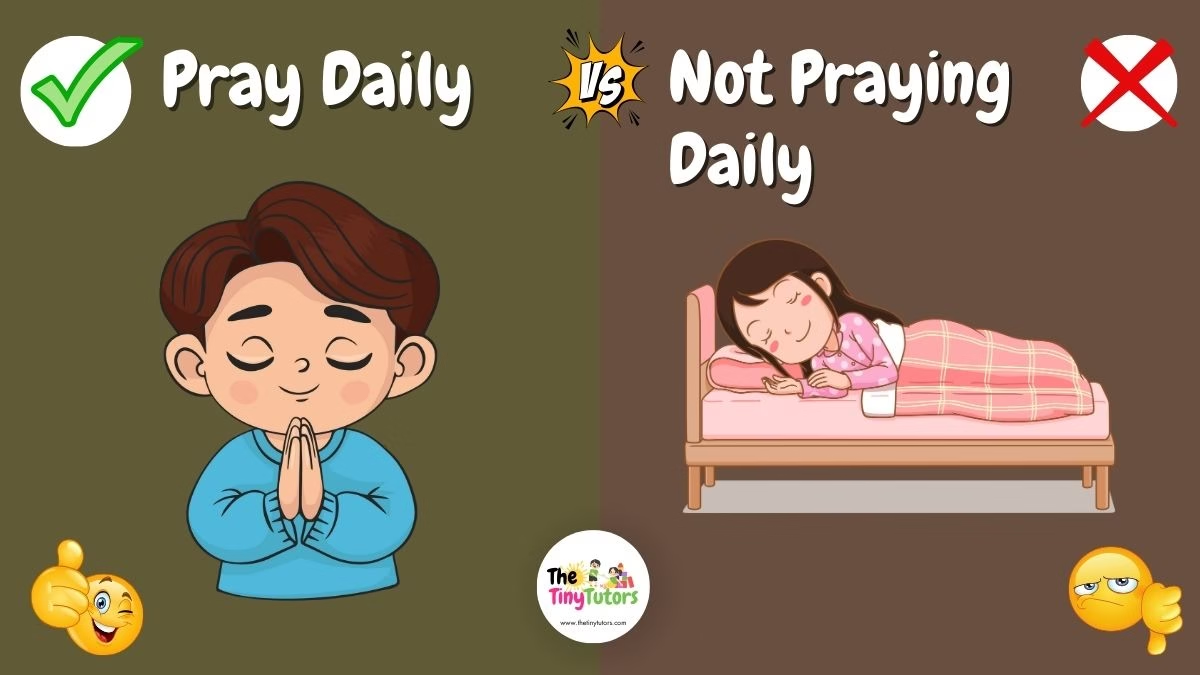
Good Habit: Praying Daily
Explanation: Praying every day is a meaningful and enriching habit that helps kids stay connected to their faith while fostering a deep sense of peace, hope, and gratitude. When children engage in daily prayer, it becomes a time for them to pause, reflect, and connect with something greater than themselves. This practice allows them to express their thoughts, seek comfort, and ask for guidance, building a sense of spiritual strength and understanding.
In addition to nurturing their faith, daily prayer provides emotional stability by offering a peaceful moment of quiet reflection in an often busy world. It helps children develop a hopeful outlook, knowing they have a source of support and comfort during difficult times. Moreover, this habit encourages gratitude, as kids learn to recognize and appreciate the positive aspects of their lives, fostering a greater sense of empathy and kindness toward others. Over time, regular prayer can become an important tool for personal growth, resilience, and a more meaningful connection to their beliefs.
Benefits: Good Habits and Bad Habits for Kids
Promotes inner peace and calm.
Builds a sense of gratitude and mindfulness.
Strengthens spiritual beliefs and practices.
Bad Habit: Not Praying Daily
Disadvantages: Good Habits and Bad Habits for Kids
May miss out on spiritual growth and reflection.
Can feel disconnected from personal beliefs.
May cause a lack of peace or balance in life.
Putting Garbage in the Dustbin vs. Throwing Garbage Anywhere
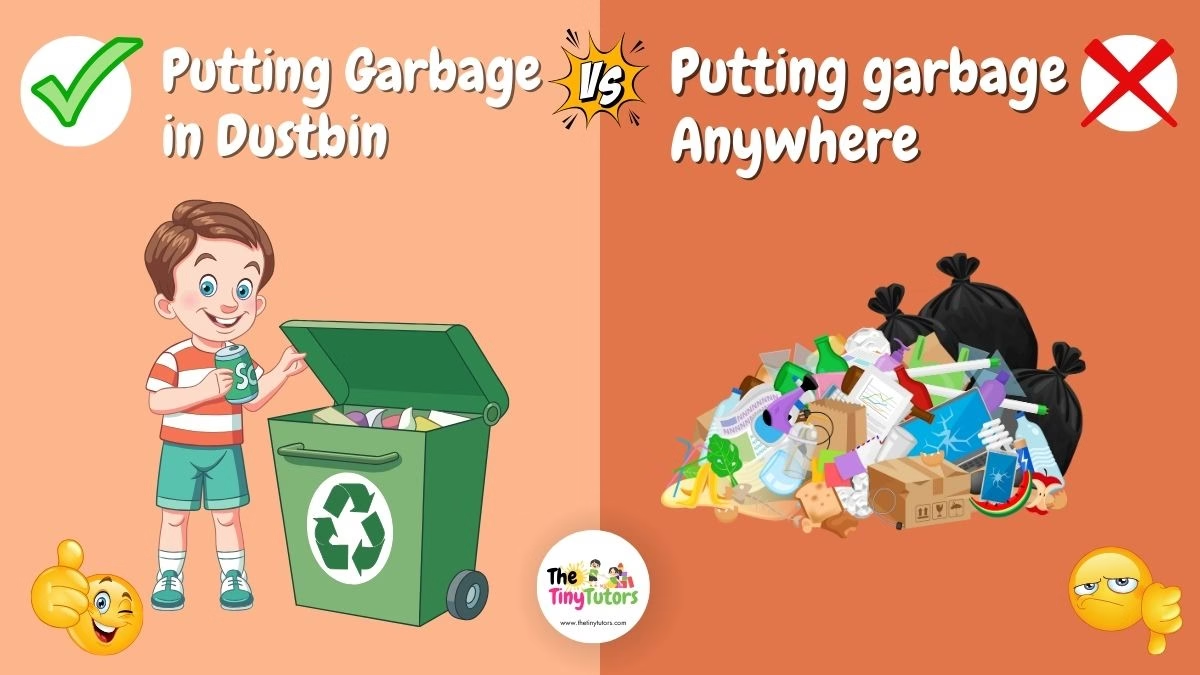
Good Habit: Putting Garbage in the Dustbin
Explanation: Throwing trash in the dustbin is a simple yet powerful habit that helps keep the environment clean and significantly reduces pollution. When people dispose of waste properly, it prevents litter from accumulating in public spaces, streets, and natural areas, protecting the beauty of our surroundings. By using dustbins, we ensure that harmful substances, such as plastics and chemicals, are managed in a safe and controlled manner, rather than being scattered around where they can harm wildlife, pollute water sources, and damage ecosystems.
This habit plays a crucial role not only in maintaining personal hygiene but also in promoting overall environmental health. Proper waste disposal helps reduce the spread of germs and diseases, making our living spaces healthier for everyone. By cultivating this habit, we contribute to a cleaner, safer, and more sustainable planet for future generations.
Benefits: Good Habits and Bad Habits for Kids
Keeps your surroundings clean and safe.
Reduces pollution and protects wildlife.
Helps maintain a healthy and pleasant environment.
Bad Habit: Throwing Garbage Anywhere
Disadvantages: Good Habits and Bad Habits for Kids
Causes pollution and damages the environment.
Can lead to pests and health issues.
Disrespects public spaces and others’ cleanliness.
Finishing Your Work on Time vs. Not Finishing Work on Time

Good Habit: Finishing Your Work on Time
Explanation: Completing tasks, whether it’s homework, chores, or other responsibilities, on time is an important habit that helps kids stay organized, focused, and stress-free. When children develop the routine of finishing tasks within the set deadlines, they learn time management skills that will benefit them throughout their lives. By staying on top of their homework and daily chores, kids can avoid the last-minute rush and the anxiety that often comes with procrastination.
This habit also fosters a sense of responsibility and accomplishment, boosting their confidence. Additionally, completing tasks on time allows more free time for other activities, like playing or spending time with family and friends, making it easier for kids to maintain a healthy balance between work and leisure.
Benefits: Good Habits and Bad Habits for Kids
Reduces stress and last-minute rushes.
Creates a sense of accomplishment and responsibility.
Helps with time management and productivity.
Bad Habit: Not Finishing Work on Time
Disadvantages: Good Habits and Bad Habits for Kids
Causes stress and anxiety as deadlines approach.
Leads to procrastination and poor time management.
Affects school performance and creates unnecessary tension.

